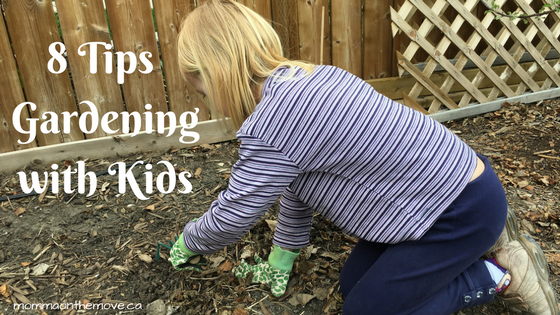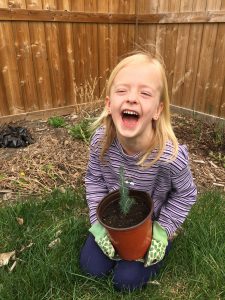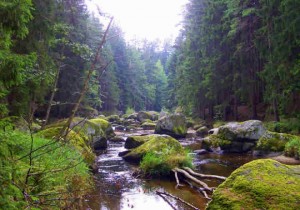I love getting outside with the kids and digging in the garden. They love getting out there and putting their hands in the dirt, planting their seeds and then watching attentively each day waiting for that first bit of green to come up.
They get so excited when it peeks through and though I sometimes have to tell them things like not to overwater their plants, they love the experience and enjoy the success of producing their own flowers or food.
Benefits of Gardening with Kids
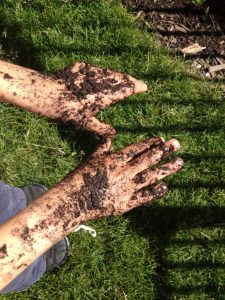 Gardening with children provides many benefits and learning and you can start involving them at a very young age. It builds upon their innate curiosity to learn and ask why, learning by doing and of course nurturing their love of playing in the dirt (playing in the dirt is actually good for you!)
Gardening with children provides many benefits and learning and you can start involving them at a very young age. It builds upon their innate curiosity to learn and ask why, learning by doing and of course nurturing their love of playing in the dirt (playing in the dirt is actually good for you!)
It teaches them responsibility, environmental awareness, patience and developmental benefits such as fine motor skills and planning and organizing. There’s even scientific and math concepts that you can teach through gardening which I always find so amazing how nature can teach us just by being involved with it. Plus it’s a fabulous bonding experience and it’s fun! Not to mention that your outside getting exercise and soaking up the sunshine.
Gardening with kids can be super easy and with these tips you’ll have success in no time.
Tips for Gardening with Kids
Give them their own spot – this is the most important thing. The kids need to feel like they have their own spot that they can garden in and that you are ok to relinquish control over! You should certainly work with them and guide them on what to do, but you really want to allow them to do it and try a few things as that is how they learn. It’s ok for them to plant a seed too deep and have it not come up or to over water an area. Yes you want them to experience success but it’s also ok for them to experience something not working. Then there’s the opportunity to discuss and explore why. And if you don’t have a lot of space try container or pallet gardening.
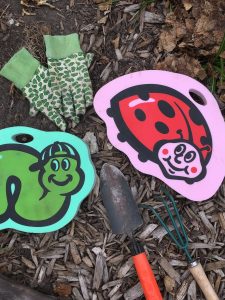 Give them their own gardening tools – set them up with their own kids size gardening gloves, garden shovel, knee pad, etc. which are easily found at your local garden center or online sites like Amazon. When they have their own tools to work with it makes them feel more important and that they have more control. Also make sure their tools are durable and strong, invest in the metal ones, not plastic that can break easily.
Give them their own gardening tools – set them up with their own kids size gardening gloves, garden shovel, knee pad, etc. which are easily found at your local garden center or online sites like Amazon. When they have their own tools to work with it makes them feel more important and that they have more control. Also make sure their tools are durable and strong, invest in the metal ones, not plastic that can break easily.
Start from seed – one of the best learning experiences in the garden is to start right from the beginning. I know in some climates the growing season is short and it’s easier to buy seedlings and plant those. Children will learn more by seeing the growing process right from the beginning – plus they get so excited when they see that first shoot of green peeking through.
In those situations start your seeds earlier inside and then transplanting them to the outdoor garden once it’s warmed up (here in Calgary rule of thumb is nothing until after May long weekend). You could do a combination, some from seed and a few of seedlings, which is what I tend to do, which provides both experiences.
Let them pick what they want to plant – if they get to choose what plants they want then this not only empowers them it gives them a more vested interest in what’s happening. As the parent give them choices that would work in your garden space and that will provide the kids with the most success. Choose from this Top 10 list of Crops for Children which are easy to grow, have short growing seasons and are fun to harvest.
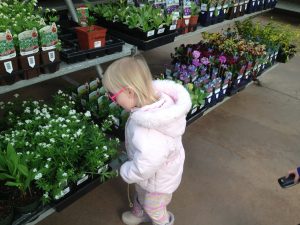 Let them decorate their garden – let the kids add a little bit of their own flare to the garden by making their own garden stake or scarecrow. Adding a fairy house or some other decorative item to a corner of their garden. Let them be creative!
Let them decorate their garden – let the kids add a little bit of their own flare to the garden by making their own garden stake or scarecrow. Adding a fairy house or some other decorative item to a corner of their garden. Let them be creative!
Show off their work – when showing off the garden – either physically or through pictures – make sure to highlight the kids garden. This will ensue a sense of pride and accomplishment and creates a motivator for them to continue.
Encourage them to work it right to the end – work with the kids to see the garden season all the way through. Get them to help care for the garden even after the fruit has been harvested and teach them how to prep it for the winter and next growing season. This is a valuable lesson in teaching them the importance of all the steps and how each step supports the fruit that they produced and enjoyed. As well as all about the circle of life.
 Model what you want them to do – the easiest way to get them started is to be gardening yourself. Kids watch and learn from the adults in their lives so if they see you doing it they are going to want to do it to. Encourage them when they come over and ask questions, give them small tasks to get them involved and take time to answer their questions.
Model what you want them to do – the easiest way to get them started is to be gardening yourself. Kids watch and learn from the adults in their lives so if they see you doing it they are going to want to do it to. Encourage them when they come over and ask questions, give them small tasks to get them involved and take time to answer their questions.
When I was little my aunt had a huge beautiful garden (and still does) that she worked and enjoyed every year. I loved going to her place and helping her, asking questions. Even as a family we had a small garden plot – and as a result all 3 of us girls love gardening and do so in our adult lives.
Starting with these simple tips will ensure the most success for gardening with kids. As you get going and the kids get older, with more experience you can then introduce concepts like rain barrels and why they’re beneficial, planting specific plants to attract pollinators like bees, humming birds and why that’s helpful to the earth. It doesn’t mean you can’t talk about them now (as you are likely doing some of those things in your garden already) but you can use them as ways to expand and build on their knowledge as they go and so as not to overwhelm them with a lot of information at once.
The best tip though is to enjoy yourself! Get out there and have fun with the kids and reap the benefits as a bonus!
Have some great tips for gardening with kids? Share in the comments below.

